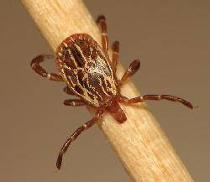It's a New Day in Public Health.
The Florida Department of Health works to protect, promote, and improve the health of all people in Florida through integrated state, county, and community efforts.
Rickettsia parkeri
Florida Health
Disease Control- DiseaseControl@flhealth.gov
- 850-245-4444
-
Florida Health
4052 Bald Cypress Way
Tallahassee, FL 32399

Rickettsia parkeri is a bacteria transmitted by ticks that can cause disease in humans. This bacteria, and other Rickettsia species transmitted by ticks, belong to a group referred to as the Spotted Fever group Rickettsia.
- SYMPTOMS and TREATMENT
- TRANSMISSION
- RICKETTSIA PARKERI OCCURRENCE IN FLORIDA
- Resource
In the limited number of confirmed cases, symptoms appeared 2-10 days after a tick bite. Unlike Rocky Mountain spotted fever (RMSF), R. parkeri cases may have an inoculation eschar resembling a scabbed sore or pimple at the site of infection, which is often the first symptom. Symptoms also included fever, fatigue, headache, muscle pain, and generalized rash. R. parkeri seems to be a less severe disease than RMSF, and may be misdiagnosed due to cross-reaction of the available diagnostic tests.
It is important to tell the physician about any tick bites that have occurred. Cases detected early in the course of disease can be easily treated with antibiotics.
Rickettsia parkeri is transmitted by the Gulf Coast tick (Amblyomma maculatum). It has been identified in many of the southern states, including Florida.
Cases have been reported throughout the range of the Gulf Coast tick, and several cases have been reported in Northern Florida since 2007. Lone star ticks may also be a potential vector.



Connect with DOH